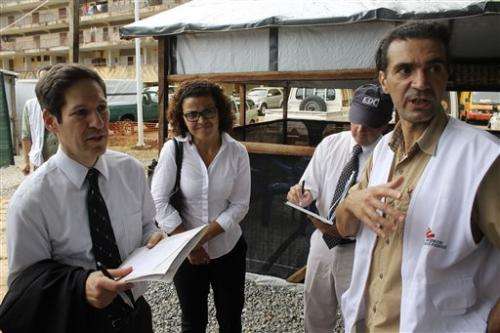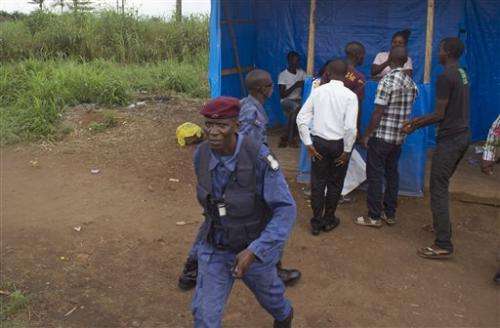Aid group: No need to isolate staff treating Ebola

Doctors Without Borders insisted Friday, after one of its doctors who worked in Guinea came down with Ebola in New York, that quarantines of health workers returning from the hot zone are not necessary when they do not show symptoms of the disease.
Craig Spencer arrived back in the United States about a week ago, reported a fever on Thursday and is now being treated at a New York hospital. Some countries have banned travelers from the three main Ebola countries—Guinea, Liberia and Sierra Leone—and the U.S. started health screening of travelers arriving from there.
"As long as a returned staff member does not experience any symptoms, normal life can proceed," Doctors Without Borders said in a statement sent to The Associated Press on Friday. "Self-quarantine is neither warranted nor recommended when a person is not displaying Ebola-like symptoms."
A person infected with Ebola is not contagious until he or she starts showing symptoms.
Despite stringent infection-control measures, the risk of Ebola's spread cannot be entirely eliminated, emphasized Doctors Without Borders, also known by its initials in French, MSF. The group has been at the forefront in the battle against the disease. Ebola has infected roughly 10,000 people and killed about half of them, according to conservative estimates.
"Extremely strict procedures are in place for staff dispatched to Ebola affected countries before, during, and after their assignments," said Sophie Delaunay, the group's executive director, said in a statement. "Despite the strict protocols, risk cannot be completely eliminated. However, close post-assignment monitoring allows for early detection of cases and for swift isolation and medical management."

The group is investigating how Spencer became infected, it said.
Several spokespeople for the group refused to say where Spencer had been working in Guinea. Doctors Without Borders runs two treatment centers in Guinea: one in Gueckedou, in the southeast where the outbreak began, and the other in Conakry. It also runs a center near Gueckedou where patients are screened for Ebola and then sent for treatment if they have the disease.
The West African nation of Mali reported its first confirmed case of Ebola late Thursday, another example of how the disease can jump borders despite increased health checks at land borders, airports and seaports. A 2-year-old girl who came to Mali from Guinea was the confirmed Ebola case. Malian authorities are now monitoring 43 people, including 10 health workers, said Fadela Chaib, a spokeswoman for the World Health Organization in Geneva. The organization is sending experts to the country to help assess the situation.
Doctors Without Borders tells health workers who are returning home after a tour of duty that they must stay within four hours of a hospital with isolation facilities. It asks them to take their temperature twice a day and to be vigilant for symptoms, which include a fever.
The group said Spencer followed these procedures and immediately notified the New York office when he came down with a fever.
The group discourages staff returning from West Africa from going back to work before the incubation period is up, so they can recover from the grueling work in the field and also so they don't pick up an infection while at work whose symptoms may look like Ebola, causing unnecessary anxiety.
More than 440 health care workers have been sickened in this outbreak, and more than half of those have died, according to the World Health Organization. That has strained already weak health systems in the worst affected countries, which had too few doctors and nurses to begin with and have had trouble convincing health workers to stay on wards at considerable risk to themselves and their families.
Liberia has offered its health workers hazard pay to treat Ebola patients, and Guinea has called on retired doctors to come back to work. Now, Guinea says it is giving $10,000 to the family of any health worker who has died from the disease, according to Dr. Sakoba Keita, the country's Ebola response coordinator. So far, 10 families have received the money—an enormous sum in Guinea, where doctors earn about $140 per month. Forty-one health workers in Guinea have died of the disease, according to WHO.
Several countries, including many in Africa, have promised to send more health workers to the West African countries, and Britain and the United States are helping to train local health workers to handle Ebola patients. Britain's support has helped WHO to double the number of health workers trained every week in Sierra Leone to 240, according to a statement from the British High Commission in Freetown. British funds are also helping to train more people to safely bury Ebola victims, whose bodies are highly infectious, and to build a 92-bed treatment center.
© 2014 The Associated Press. All rights reserved.














